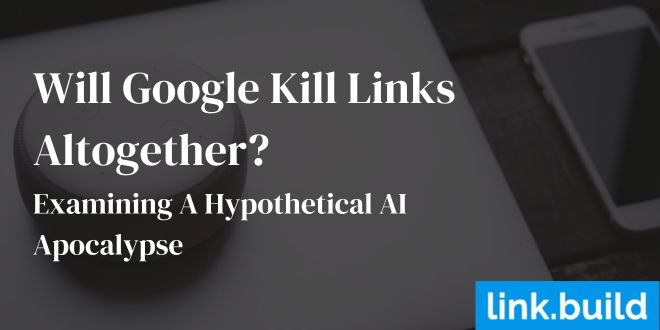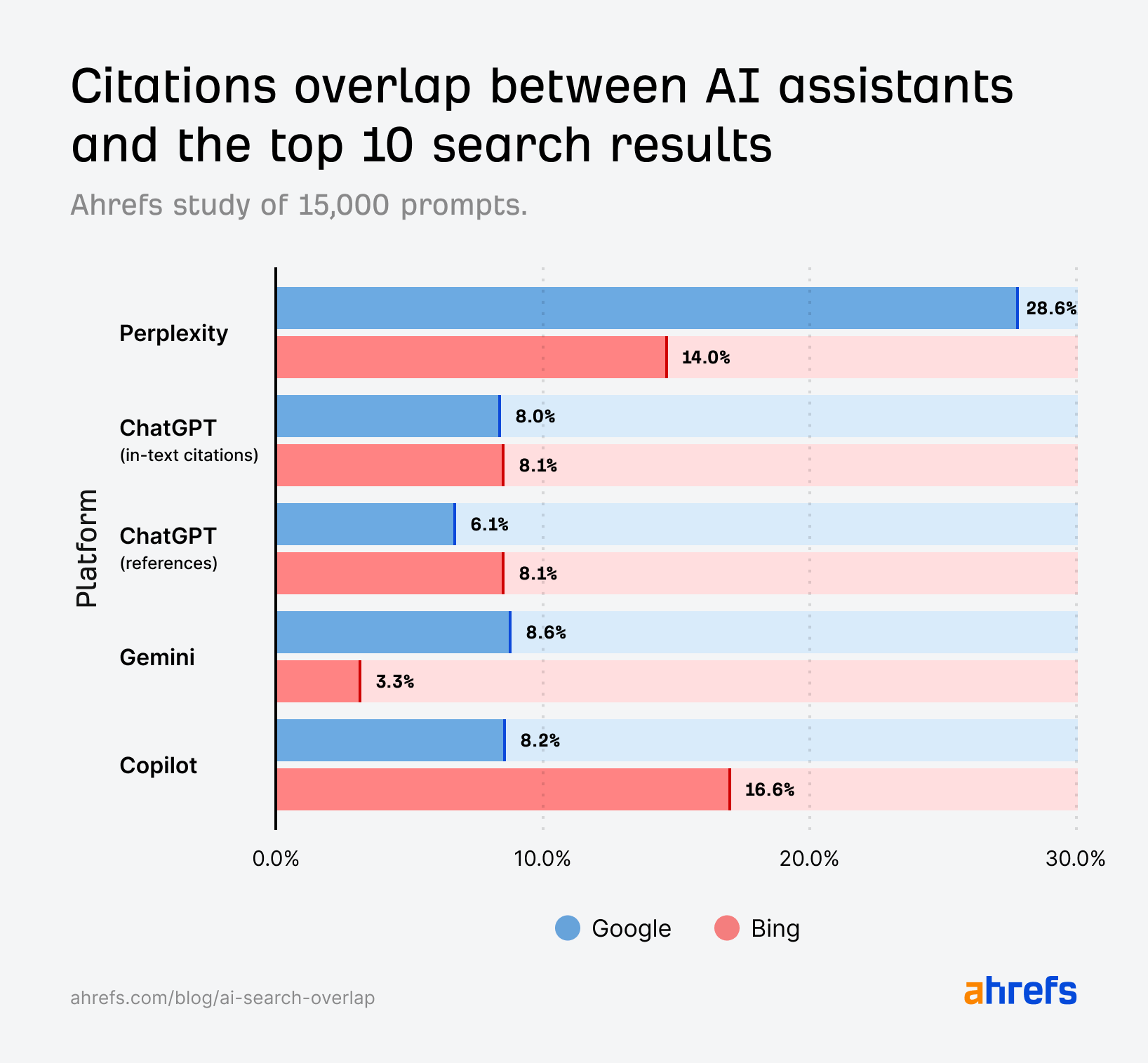Is AI Killing the Link Building Game?

Between Google’s AI Overviews cannibalizing traffic and zero-click searches becoming the norm, it’s rumored that traditional backlinks are about to become obsolete. For decades, backlinks have been the main driving factor for search engine optimization (SEO), signaling authority and relevance. But now that generative AI is changing the game of search and Google isn’t prioritizing clicks, the possibility of backlinks becoming irrelevant is a legitimate concern.
In this article, we’ll examine the possibility of Google phasing out links as a ranking signal and the impact that would have on businesses. Then, we’ll touch on how businesses can generate traffic from generative AI and the role traditional optimization – including backlinks – plays in gaining visibility. Finally, we’ll dive into what it looks like to optimize your website, content, and links for AI-driven search to get meaningful results. Because while AI is changing the game, it’s not the end.
The rise of AI Overviews and zero-click searches
Google’s AI Overviews feature has been out for a little over a year, and while its main purpose is to provide fast answers to search queries, it also kills clicks. By summarizing a handful of websites directly on the search results page, Google eliminates the need for users to click on results and that means a massive drop in traffic for sites that rank. If a first page, first-spot ranking didn’t guarantee clicks before, it definitely doesn’t now.
Sometimes Google’s AI Overview isn’t sufficient and users click on search results to find what they’re searching for, but considering 60% of Google searches ended without a click in 2024 – compared to 26% in 2022 – it’s clear the majority of users are happy with Google’s overviews even if they aren’t correct. That’s a problem for companies trying to generate business by driving traffic to their website.
Since Google summarizes content and eliminates the need for users to engage with the website itself, it seems like this would weaken the value of backlinks. After all, even if your site ranks #1 on the first page for competitive search queries, you’re not going to get as many clicks as you would in a pre-AI-Overview world, so does ranking even matter anymore? Do backlinks even count?
These are legitimate concerns but it’s not the whole story. Backlinks and rankings are still relevant, perhaps more than ever.
Businesses are seeing a rise in traffic from generative AI applications
AI Overviews summarize content from high-ranking, authoritative websites, which means you still need to rank traditionally to get featured in an overview and backlinks are part of that foundation. If you can get Google to see your website content as authoritative on a subject matter, your website will be cited and linked in the overview at the top of the page above organic results.
AI Overview citations do produce some click throughs. And while businesses are reporting limited clicks from AI Overviews, the story doesn’t end there. Web pages that rank well enough to be featured in AI Overviews are also more likely to appear as resources cited within generative AI applications like ChatGPT, Claude, and Perplexity. And guess what? Users click those links often. In fact, one brand reported a 436% rise in traffic directly from AI sources. Other brands have reported similar results – they’re getting a lot of traffic from ChatGPT and similar applications.
This means if you want to compete you need to get these AI applications to cite your content as a resource for relevant prompts. And again, traditional search ranking strategies, including backlinks, are the foundation. The likelihood of Google eliminating backlinks as a ranking factor are slim, although how backlinks are factored into search rankings is always changing. For example, in the beginning all links counted toward rankings. Over time, Google’s algorithm learned to identify and ignore spammy links, and now Google devalues external links sitewide for domains it considered to be spam. Today, backlink quality matters more than ever.
Can authority be established without backlinks?
It’s a bold claim, but some SEO pros are asking if there’s a way to build authority without backlinks. The answer is yes and no. While there are many factors that contribute to establishing authority, backlinks remain the bread and butter. However, since Google has shifted toward semantic search, there’s a good possibility that we will see new algorithm changes that establish authority in a new way. It’s just more likely to complement rather than replace backlinks.
Using structured data (Schema markup), in-depth topic coverage, comprehensive answers to common questions, and having a reputable author profile all play into Google’s assessment of authority. However, in highly competitive industries where the top companies have hundreds of thousands of links from authoritative sources, it’s probably not possible to outrank them using topical completeness alone. Google still needs to measure off-page trust, and backlinks still do that job well.
Underneath all the AI gloss, Google is still a link-powered search engine, and backlinks remain one of the most efficient ways to discover new content and assign a basic level of trust, especially when assessing new domains and unfamiliar brands.
So, while authority can be established without backlinks, it’s not reliable on its own. Even the most comprehensive websites with perfect architecture will fail to rank and show up in AI summaries without off-site trust signals, like a strong backlink profile. If skipping backlinks works today in a low-competition niche, as soon as you get some competitors who build quality backlinks, they’ll overtake you.
Content hubs win over link wheels
While high-quality, authoritative backlinks remain a critical SEO component for now, the rules of the game have changed. Link wheels used to be popular but are quickly becoming less effective because they don’t command links from relevant, authoritative websites. The websites that will pass down link juice won’t link generic, shallow content, which is why many businesses resort to buying paid links in bulk. This is a bad idea. Paid links are not only against Google’s terms, but they’re not worth as much. Any site that sells links likely falls under one of the following categories:
· The site doesn’t rank so there’s no link equity to pass down
· The site isn’t indexed so it won’t help with SEO
· Eternal links for the entire domain have been silently devalued by Google
Google’s algorithm is no longer impressed by the number of backlinks you have. It’s looking for quality and relevance. Today’s search algorithms lean heavily toward topical authority over popularity. You can get Google to see your site as a topical authority through comprehensive coverage of your topic rather than just posting a few blogs here and there. But you also need some high-authority backlinks from authoritative websites in your niche. For example, if you’re running a personal finance blog and you get backlinks from NerdWallet or Bankrate, that’s a huge trust signal with SEO weight. If you’re getting backlinks from recipe sites, it’s not going to have the same effect.
Relevance is non-negotiable and that’s where content hubs come in. Content hubs are a series of interconnected articles that cover every angle of your niche and are exactly what Google is looking for when it’s trying to determine relevance and authority. This is precisely what’s required to get featured in AI summaries. When you build comprehensive, authoritative content hubs, you naturally attract links to in-depth content from other websites in your industry. This is called digital PR and it’s highly effective.
To recap, to survive the AI-driven search era, you need two things: top-quality backlinks from authoritative sites in your niche and deep topical coverage that proves you’re the expert. Forget about link wheels, PBNs, and link buying. You’ll earn genuine, powerful authority through relevance and depth, and if you want to make it to the top you’ve got to be seen as the best in your industry.
Will linkless mentions replace backlinks?
Many people are speculating that brand citations and context might replace traditional backlinks completely. Brand citations are references to your brand, product, or content without a hyperlink. On the surface, this seems like a possibility. Google’s AI algorithms are sophisticated enough to understand context and relationships between entities across the internet.
Google can parse brand mentions without links. In fact, search engines have been experimenting with implied links for years. Google’s knowledge graph and natural language processing (NLP) can recognize when your business is being talked about even without a hyperlink. And when everyone is talking about a brand in a positive way, that’s a ranking signal even if it’s not officially stated.
While backlinks tell users, “Go here,” brand mentions tell users why you’re worth paying attention to, who you are, and how you fit into a larger conversation. Brand mentions provide richer data for search engines. For example, when dozens of sources mention your brand related to a specific topic, Google starts to understand what you’re about. But there’s a catch: mentions are easier to fake.
Unlike backlinks, which require some editorial oversight (someone has to add your link), mentions are easy to generate at scale. Getting cheap content stuffed with your brand name isn’t hard, and generative AI makes it even easier. You could flood the internet with brand mentions that seem legitimate. How Google would police this potential is still unknown.
Large corporations like Amazon are already struggling to identify and remove fake reviews and have implemented strict policies to make it a little easier. For example, reviewers are required to read their purchased Kindle books at a normal pace without skipping around or their reviews can be removed. Given how difficult it is for Amazon to control fake reviews on its own site, it’s hard to imagine how Google might account for fraudulent brand citations on sites it doesn’t control.
Will linkless mentions replace backlinks? Maybe, but it’s probably not going to be anytime soon. Until Google figures out how to verify the authenticity and relevance of mentions, backlinks – especially high-quality, relevant ones – will still hold weight.
Backlinks are a foundation for AI search optimization (but they're not everything)
Search algorithms have evolved from interpreting keywords and backlinks to understanding meaning, context, and intent. AI-powered tools like Google’s Search Generative Experience (SGE) and other large language models (LLMs) are rewriting the rules for how users discover and consume information. Your website is no longer competing solely on the basis of whether you’ve included the right keywords. Now it’s competing on whether you present a clear, trustworthy identity that AI systems can understand. If you don’t adapt, you risk becoming invisible in a search environment where context is the new king.
You would be surprised how small the overlap in AI results and organic Google results is.

Traditional search engines wanted to know if your content contains all the right words and phrases. AI search wants to know who you are and whether your expertise is verifiable. It’s not just about answering a query. You need to prove you’re the best source to trust with the answer. That means you need extensive content, branding, and authority to get visibility. If you want to stay relevant when algorithms are getting smarter you need to optimize your website for AI-driven search. You need to blend classic SEO best practices with signals that feed AI systems exactly what they need to feature your content.
Start with traditional ranking strategies
Google and ChatGPT cite articles with clear context, well-cited sources, and thorough content, but still favors sites that rank traditionally in the search engine results pages (SERPs). In other words, you need to rank and build credibility to get featured in an AI summary, whether it’s in a Google Overviews or an application like ChatGPT. And backlinks are a fundamental part of that equation.
The fundamentals still matter. You need on-page optimization, technical SEO, and of course, backlinks to prove your site is relevant in your niche. The more credible sites link to you, the more AI systems assume you know what you’re talking about. And when those AI tools search for reliable sources, your site is more likely to be used as a resource when you have an established, authoritative backlink profile.
Build your brand as an entity AI can recognize
With AI search leading the way, backlinks will help search engines and AI models understand your brand. Every high-quality link reinforces your authority. Over time, this creates an entity in the eyes of AI that projects expertise and credibility. Without this foundation, your site risks being buried by competitors with stronger digital footprints. Strategic link building is how you position yourself as the obvious choice for both humans and AI-generated responses.
Turn backlinks into AI search visibility
AI-driven search is changing the rules, but authority still wins. Backlinks are still the foundation of credibility, whether you’re ranking in the SERPs or being used as a citation in an AI summary. The difference is that backlinks do more than just help you rank. Now, they help AI understand the trustworthiness of your brand. If you want to future-proof your search visibility, you need an intentional, high-quality link building strategy that works for traditional algorithms and AI tools.
Ready to earn the backlinks that will make AI notice you? Reach out today and let’s start boosting your authority.


.svg)


.jpg)
.jpg)